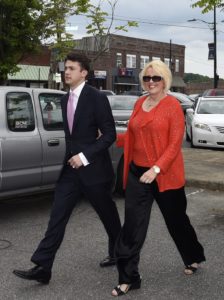
Brooke Covington, a member of the Word of Faith Fellowship church in Spindale, N.C., leaves a hearing at Rutherford County Courthouse accompanied by attorney Joshua Valentine in Rutherfordton, N.C. (AP Photo/Kathy Kmonicek)
Ten former members of the Word of Faith Fellowship church say they have been contacted by U.S. federal and state authorities investigating allegations of abuse, forced labor and visa fraud after a series of Associated Press stories about the North Carolina-based evangelical sect, which has branches in Brazil and Ghana and affiliations in other countries.
In Brazil, the federal police told AP the justice department has asked for a 2012 inquiry to be reopened into complaints that Word of Faith Fellowship’s two churches in the country were illegally sending minors to the United States. The country’s foreign ministry said it was contacting the U.S. consulates in Brazil and U.S. law enforcement agencies for more information, and added that its embassy in Washington, D.C., was trying to reach Brazilians who came to the U.S. via the church.
In February, the AP published its initial story about Word of Faith Fellowship in which 43 former members said congregants were regularly punched and choked in an effort to “purify” sinners by beating out devils. This week, AP revealed how Word of Faith Fellowship took over two congregations in Brazil and created a pipeline of young laborers who say they were brought to the U.S. and forced to work for little or no pay.
Neither church founder Jane Whaley nor the pastors at the Word of Faith Fellowship branches in the Brazilian cities of Sao Joaquim de Bicas and Franco da Rocha responded to repeated requests for comment.
The latest AP stories quoted 16 Brazilians who said they were brought to the U.S. on tourist and student visas and forced to work at the church’s rural compound in Spindale, N.C., or at businesses owned by senior church leaders — a violation of the visas’ stipulations.
The U.S. consulate in Rio de Janeiro issued a statement Wednesday saying the State Department was looking into the claims, adding that it “takes all allegations of fraud seriously and strives to ensure the integrity of U.S. visa and U.S. passport adjudications.”
And Jill Rose, the U.S. attorney in Charlotte, confirmed to AP that her office has an “active, ongoing investigation into allegations against Word of Faith Fellowship,” but said she could not go into specifics.
“Fact gathering is not a quick or easy process, which at times may lead to the erroneous perception that my office is not actively looking into a matter,” Rose said.
In January 2014, three former church members met with Rose, then an assistant federal prosecutor, and complained of physical and verbal abuse by church leaders, according to a recording of the meeting obtained by the AP. They also told Rose that congregants from Brazil were being funneled to the U.S. and forced to work, the recording reveals.
The former followers who have been interviewed by state and federal investigators in the U.S. said they were contacted after AP’s stories were published, and that the federal investigators’ focus included visa fraud, forced labor and the treatment of foreign church members.
Former congregants have long expressed fears that the church would never face any comprehensive investigation, so Tiago Cherubino said he was surprised to receive a call a few months ago from an agent with the State Bureau of Investigation, a North Carolina agency that investigates criminal activity.
At first, Cherubino said he was reluctant to talk, because the “church always gets away with everything.” But he eventually spent four hours with the agent and a representative of the U.S. Department of Homeland Security, he said.
He said he told them how he traveled from Brazil under a compromised visa, that he worked for free at businesses owned by company ministers, and that he saw congregants brutally beaten in sessions meant to expel devils.
“In the end, they apologized to me. They both said they were sorry that happened and they were going to do everything to stop it,” Cherubino said. But he said they also warned him the investigation could take time — and that, if the church eventually is charged, it could be with something like tax evasion.
“I told them I’m afraid of retaliation. We’re all afraid they will find a way to retaliate,” Cherubino said.
In Brazil, Joao Leite, a representative in the state of Minas Gerais — home to the Sao Joaquim de Bicas church — called Word of Faith Fellowship “a dangerous sect” and pushed for his legislature’s human rights commission to hold hearings.
Word of Faith Fellowship has been scrutinized on numerous occasions in the U.S. by law enforcement and social services agencies since the early 1990s, all without significant impact, mostly because followers refused to cooperate. A previous AP report outlined how congregants were ordered by church leaders to lie to authorities investigating reports of abuse.
Still, some former members told the AP they also believe authorities did little to intervene, allowing the abuses to persist despite their pleas for help.
One ex-congregant, Matthew Fenner, spent nearly two years pleading with various enforcement agencies to act on his allegations that he was beaten at length to expel his “homosexual demons” after a January 2013 church service. Eventually, state charges were filed against five former members; that case is still working its way through the court system.


